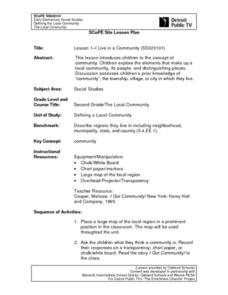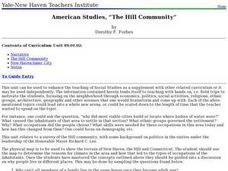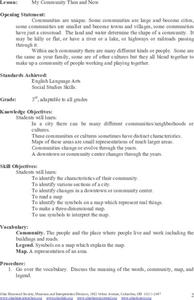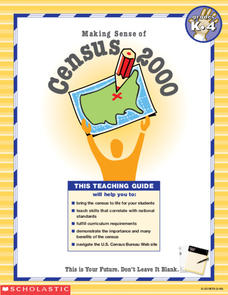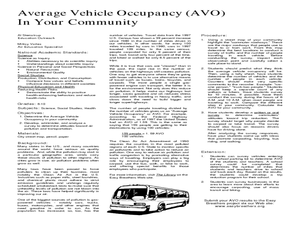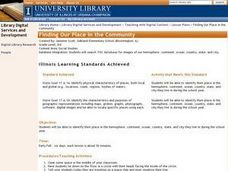Curated OER
What Caused The Industrial Revolution In Maine?
Students investigate the apparent causes of the industrial revolution in the state of Maine. They read a text provided by the teacher. Then students use a concept map to organize information. The core of the discussion and research is...
Curated OER
Discovering the Local Community
Third graders create a mini-atlas of the human and physical characteristics of their local community, which includes landforms, climate, vegetation, population, and economics. They use nonfiction map-related resources to obtain ...
Curated OER
United We Stand: One Day
Students explore what it means to be part of a community. In this community lesson, students read a story about a man who finds unity in community. They then discuss how the community affected his life. This lesson also contains 5...
Curated OER
The Road to Success
Students chronicle the main events in their lives so far. They draft, revise, and publish an anecdote. Students get to know their fellow classmates and they build a nurturing learning community. Students take an interest inventory and...
Curated OER
Locating Points Using Cartesian Coordinates
Students discover coordinates as they explore Chicago. In this math lesson plan, students give the coordinates of a point, plot a point, and use the coordinate system in locating places on a map.
Curated OER
Families and neighborhoods
Students create their house to add to a class "neighborhood". For this lesson on family and community, students read the book Family by Todd Parr and discuss how all families and houses are different. Then, students create their own...
Curated OER
Developing a Life-Managment Plan
Students investigate values and goals to develop a life-management plan. In this life goals lesson, students identify life choices and factors affecting the choices. Students establish short and long term personal goals and the resources...
Curated OER
Favorite Foods
Students explore human health by completing food choice worksheets. For this world hunger lesson, students discuss the importance of eating three daily meals and how to feed the underprivileged through charities and soup kitchens....
Curated OER
Where Am I, and How Do I Get Where I am Going?
Students describe geographical places through art, music, writing, and math. They compile information in booklets which may be published.
Curated OER
Lesson 1-I Live in a Community
Second graders brainstorm the concept of a community and all the elements involved in the make up of one. They pull from the resources on the community that they already live in or have lived in. In addition, they share their reflections...
Curated OER
Geography: Mapping Neighborhoods
Learners examine their neighborhoods and draw maps reflecting land use. In addition, they make predictions about their community's future. Students also consider the impact of business and industry on their communities and predict ...
Curated OER
Community Celebration
Sixth graders invite members of their community to a celebration in which they present information about what they have gathered during the Aqua Pure project. Using art, they unveil their projects to the community and extend their thanks...
Curated OER
Social Studies: The Connecticut Hill Community
Students discover the reasons for the settlement of the Connecticut Hill Community. Through an examination of the climate, occupations of the inhabitants, and demographics, they discuss reasons people choose locations for settlement. ...
Curated OER
The Joy of Community Field Day
Pupils engage in community related activities to recognize and thank local merchants. Merchants raise awareness regarding what resources are available in the local and neighboring area for students and their families.
Curated OER
1668 Map of Newark Activity
Eleventh graders read a map for historical information, decipher a map legend and symbols, and expand their knowledge of a historic time.
Curated OER
My Community Then and Now
Third graders examine and discuss the characteristics of their community. They compare their present community with its characteristics at the turn of the 19th and 20th centuries, and they make flat or relief maps that include unique...
Curated OER
Making Sense of the Census
In this unit of lessons, students make sense of the Census. They examine why a census is taken and participate in activities.
Curated OER
A Geographic Study of Florida's Diverse Community
Eighth graders identify major population centers and their demographic features using an outline map of Florida and the Internet to.
Curated OER
Average Vehicle Occupancy In Your Community
Students determine the average vehicle occupancy in their community. In this transportation lesson students develop and analyze a survey to determine attitudes towards air pollution and transportation.
Curated OER
The Geography of Land Planning
Students utilize simple maps to plan a town, supply water resources and then fit their towns into the a larger community. They assess how hard it is to plan a town by group decision-making as well as the services required to help a town...
Curated OER
Finding Our Place in the Community
Third graders search TDC database for images of our hemisphere, continent, ocean, country, state, and city. They identify their place in the hemisphere, continent, ocean, country, state, and city.
Curated OER
Building a School Model: An Academic Challenge
First and second graders explore aspects of design. They discuss and design the ideal classroom building complete with window and door placement. Additionally, students observe and note features found in neighboring classrooms as...
Curated OER
Grocery Store Field Study
Students visit a local grocery store (not a community market) to gather information about where some commonly eaten produce items come from. Once they have collected this information, locate the countries of origin on a map and research...
Curated OER
Costco and Zoning
Young scholars research zoning laws in the community. They interview city planners to find out necessary steps for approval. Students collect information about facilities being proposed. They write an article on their findings.









